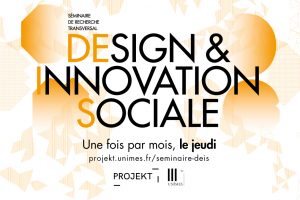
Codesign workshop with “Forum des Politiques de l’Habitat Privé (FPHP)” during the conference « Design & politique(s) : pour un dessein commun »
Who we are
PROJEKT is a research center of the University of Nîmes (France) which brings together about twenty people and develops project-grounded design research programs in the field of social innovation. Created in September 2016 after three years as a research group, PROJEKT is the first academic research unit officially and fully dedicated to design in France.
PROJEKT’s approach to design
Within the PROJEKT lab, design is seen as a way of thinking (design thinking) based on the following philosophical principle: the world is not only an object to be studied, it is also a project to be improved.
Emphasis is placed on designing services, systems and experiences to address social innovation issues. Social innovations are not primarily market-oriented, their beneficiaries are collectives or even society as a whole. Targeting social needs in a positive and beneficial way, they aim at the “well-being of individuals and communities” (OECD, 2011). They appear as new solutions in which beneficiaries are directly or indirectly involved and mobilized.
PROJEKT is a research center for design and social innovation. Our area of research and action is concerned with public policies, sustainable development, new forms of housing, health care and e-health, digital humanities or education innovation. The ultimate goal of our research is to improve the “inhabitability” of the world.
PROJEKT’s methodology
The PROJEKT lab develops project-grounded design research programs in the field of social innovation. By “project”, we mean a design act and, by “project-grounded research”, we mean conducting research projects based on design acts (i.e. projects). Suggested by Alain Findeli, the “project-grounded” methodology is the original way we approach Research Through Design, especially within a lab thus named “PROJEKT”. It is an action-research by design method which has two objectives: on the one hand, it aims to advance knowledge in the field of design and social innovation; on the other hand, it aims to transform social systems through design acts (or projects).
Our research programs
Axis 1 “Design, social innovation, project-grounded research” deals with collective cross-disciplinary research and with our epistemological, methodological and pedagogical common ground. It consists of 3 research programs:
- General theory of design and methodology of design research
- The ‘user’ in design: models, references, definitions
- Pedagogy of design, design of pedagogy
Axis 2 “Design, public policies and territories” connects user-centered design for public services, sustainable design and design for the vulnerable. It consists of 3 research programs:
- Design, public services and beneficiaries
- Design, new forms of housings and communities
- Design, care et and medico-social life
Axis 3 “Design and digital media/cultures” overlaps the field of design for digital social innovation. It aims to increase the knowledge of the digital transformation of society and to improve it through digital social design projects. It consists of 2 research programs:
- Editorial design and digital publishing
- Design and e-health
Social Media

